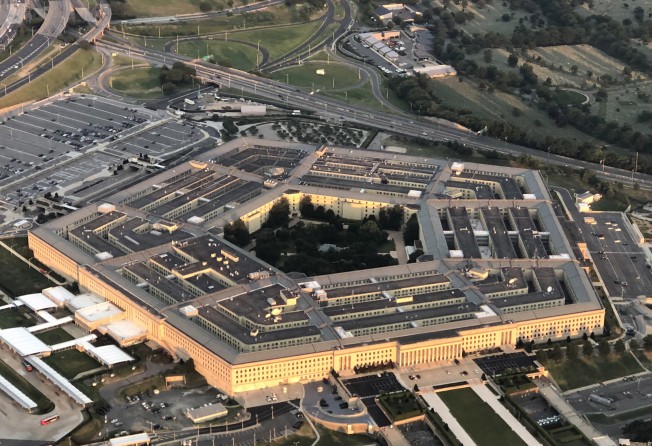Pentagon official says US is concerned by ‘heavier hand Beijing has taken’ in Hong Kong
- Randall Schriver, assistant secretary of defence for Indo-Pacific security affairs, cites trend toward ‘less autonomy, more influence from Beijing’
- His comments come as US House passes bill to sanction Chinese officials deemed responsible for ‘undermining basic freedoms in Hong Kong’

Hong Kong’s long-held reputation as one of Asia-Pacific’s best, most well-regulated police, judicial and administrative systems is under threat as Beijing takes an increasingly aggressive and intrusive stance, a senior Pentagon official said on Tuesday.
While the US is concerned with some of the increasingly violent tactics adopted by protesters in the financial capital, “in general, we are concerned about the heavier hand that Beijing has taken and the Hong Kong authorities have taken with what we regard as legitimate activities on the part of the people of Hong Kong”, said Randall Schriver, the assistant secretary of defence for Indo-Pacific security affairs.
Schriver, speaking at a China Defence and Security conference in Washington organised by the Jamestown Foundation, cited a worrisome trend toward “less autonomy, more influence from Beijing” and “an erosion of the things that were promised to the people of Hong Kong”.
The range of topics at the Jamestown conference reflected Washington’s increasingly suspicious view of Beijing as the world’s two largest economies face off in areas ranging from trade and security to education, investment and visa policy. Panels at the forum on Tuesday discussed China’s international propaganda efforts and political interference, its military build-up and its crackdowns in Xinjiang and Tibet.
Schriver also urged Beijing to pressure Pyongyang into being more responsive in US-North Korean talks; he chided China for slippage in its sanctions enforcement, particularly that involving ship-to-ship transfers of banned North Korean goods in Chinese waters.
But in polarised Washington, support for Hong Kong is a rare issue of bipartisan agreement. The city of seven million has seen four months of protests, including massive marches and sometimes intense demonstrations involving tear gas and live rounds, amid growing global concern that Beijing is tightening its grip on the territory and undercutting democratic rights there. On Tuesday, Hong Kong’s chief executive Carrie Lam ruled out making concessions as protests become more violent. Police recently termed the unrest “life-threatening” after a small bomb detonated.
Schriver said that the United States hopes the Hong Kong situation can be resolved peacefully, urging authorities to help resolve legitimate grievances of citizen’s rights as guaranteed under the Basic Law, Hong Kong’s mini-constitution. “For those who are having those aspirations, and speak out merely for respect of those rights, we’re 100 per cent behind them,” he said.
His comments followed a speech by US President Donald Trump last month at the United Nations in which he called on Beijing to protect “Hong Kong’s freedom, legal system, and democratic ways of life” amid growing US-China tensions.
Later on Tuesday, the House of Representatives, by a voice vote, passed the Hong Kong Human Rights and Democracy Act, legislation to amend the US-Hong Kong Policy Act of 1992, which has kept US business and other ties to the city intact after its 1997 handover from Britain to China.
If also passed by the Senate and signed into law by President Trump, the act, which enjoys widespread bipartisan support, would, among other mandates, require the US to sanction Chinese officials deemed responsible for “undermining basic freedoms in Hong Kong”.
For months before his UN speech, Trump remained non-committal on Hong Kong, perhaps reluctant to offend Beijing in advance of resuming trade negotiations. On Tuesday, Schriver declined to comment on the legislation, which has fuelled a narrative from Beijing that foreign “black hands” are meddling in China’s internal affairs.
“You don’t have to do a lot to be accused of being a black hand,” Schriver said to audience laughter. “We seem to be stuck with that by nature of who we are, that we believe in human rights and free speech.”
Schriver, a prime architect of the Trump administration’s more robust security response to China, said that the US and China remain far apart in their visions for the Asia-Pacific region. Beijing’s steps aimed at frustrating open navigation in international waters, the sovereignty of other nations and adherence to rule of law are driving Washington’s more robust response and military spending priorities, he added.
Increasingly, the US is investing in hypersonic weapons, space and cybertechnologies to counter Beijing, Schriver said. The Pentagon has also created a new department to better coordinate US defence, economic and technological strategies toward China, he added.
“China’s modernisation is a pacing threat for us,” Schriver said. “We think this puts us in a better position to compete.”
Schriver recently returned from a trip to Beijing where Chinese officials told him they seek stability in the US-China relationship, he said. “We’re still trying to figure out what they mean by that,” he added.
While the Pentagon wants to maintain relations with the People’s Liberation Army to avoid “unintended incidents or accidents” – and to work on areas where the interests of both nations align – it also wants China to follow international norms, he said.
But he stopped short of using some of the more inflammatory language by Trump administration officials, including recent references to a “clash of civilisations” between the two global powers.
“We say competitor. We don’t say adversary. We don’t say enemy,” Schriver said. “Competition can be done in a way that can bring out [something] better in both countries.”